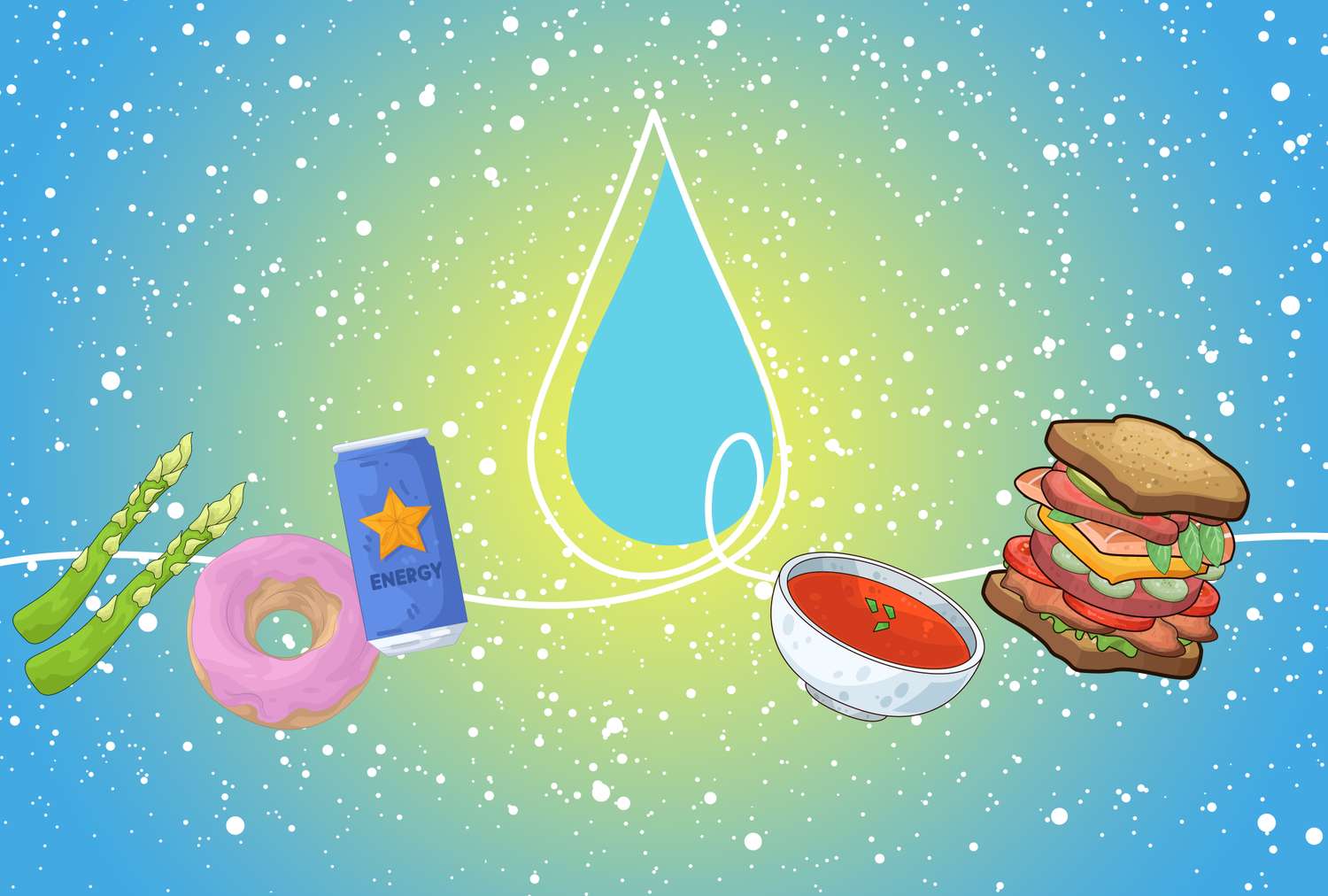Blog
6 Surprising Foods That Could Be Dehydrating You

- Staying hydrated supports key functions, such as temperature regulation and digestion.
- Besides salty foods, other foods can also dehydrate you, such as spicy foods and sugary treats.
- Instead of avoiding them altogether, pair dehydrating foods with water or water-rich options.
Water makes up 65% of the human body and is crucial for supporting many bodily functions, including temperature regulation, digestion, energy levels, waste removal and nutrient transport—just to name a few. When you’re dehydrated, your body has to work harder to function normally, which can lead to symptoms like fatigue, headaches, dizziness, dry mouth, confusion and dark-colored urine. Chronic dehydration can lead to more serious problems, such as kidney stones and heart complications. “Hydration helps keep blood at the right viscosity, making it easier for the heart to pump efficiently,” explains Michelle Routhenstein, M.S., RD, CDCES, CDN, a cardiology dietitian and heart-health expert at Entirely Nourished. “This reduces strain on the cardiovascular system and helps to lower the risk of high blood pressure and heart complications,” she adds.
While you may be aware that eating salty foods can lead to dehydration, you may not know that other foods can also be problematic. Below, we asked experts to share the surprising foods that dehydrate you.
1. Spicy Foods
While spicy foods don’t directly cause dehydration, they can contribute to fluid loss through sweat. The compound responsible is capsaicin—the active ingredient in chile peppers that gives them their distinctive heat. Capsaicin activates receptors in the mouth and throat that make the body feel hot, causing you to sweat. It may also temporarily boost metabolism, raising body temperature further and promote additional fluid loss.
2. Energy Drinks
Although not technically a food, energy drinks can contribute to dehydration. Energy drinks are often packed with caffeine and sugar, which affect how your body maintains hydration. Caffeine and sugar act as diuretics in some people and increase urine production. This causes greater fluid loss and dehydration, notes Routhenstein.
Recent research suggests consuming more than 500 milligrams of caffeine per day can cause acute diuresis, or increased urination. Even lower amounts—300 mg—may contribute to dehydration in people who are not regular caffeine users. Energy drinks may contain more caffeine than coffee or tea, making it easy to overdo it. Drinking multiple energy drinks a day can quickly exceed the recommended caffeine limit and can increase your risk of dehydration.
Additionally, a single energy drink can exceed your daily limit for added sugar, leading to excess sugar in the bloodstream. The body responds by increasing urine production to flush out the surplus of sugar. Combined with caffeine’s potential diuretic effect, the sugar content may further contribute to dehydration.
3. Deli Sandwiches
“Deli meats are higher in sodium and preservatives, which make your kidneys work harder to remove the excess salt, causing you to lose more water through urine,” explains Routhenstein. For example, a slice of processed turkey has 144 mg of sodium, while a slice of processed ham has 123 mg. ,
Pair deli meats with other ingredients in sandwiches, such as condiments and toppings like olives and pickled jalapeños, and you have a sodium-laden meal that may leave you dehydrated. Eating too much salt disrupts the balance between sodium and fluid in the body. Excess sodium in the bloodstream pulls water out of your cells to restore fluid balance, leading to cellular dehydration. This can lead you to feel thirsty and dehydrated, even though you may still technically be drinking water.
4. Tomato Soup
Tomatoes themselves may not dehydrate you, but the mix of ingredients in a tomato soup can be dehydrating. “Tomato soup may be mostly liquid, but it’s typically high in sodium, which causes your body to retain water in tissues rather than hydrate cells effectively,” Routhenstein says. This can have a dehydrating effect on the body. Additionally, the classic grilled cheese pairing contributes to a tomato soup meal’s sodium content, further exacerbating dehydration.
5. Asparagus
Despite its high water content, consuming asparagus in large quantities (greater than five servings) can dehydrate you. That’s because asparagus contains asparagine, an amino acid with diuretic properties, explains Lauren O’Connor, M.S., RDN, RYT. “If you’ve been active on a hot day and your hydration isn’t adequate, the increased urination it [arginine] triggers might make you feel a bit more parched,” she adds.
Still, there’s no need to remove this nutritious vegetable from your grocery cart. Instead, pay attention to portion sizes and stick to just a few servings of asparagus.
6. Sugary Treats
Sugary treats like candy, pastries, desserts and sweetened cereals can dehydrate you, says Carlette Roberts, RD. Sugary treats increase blood sugar, causing a shift in fluid balance. When there’s too much sugar in the bloodstream, the body pulls fluid from cells to increase urine production to remove excess sugar and restore fluid balance.
Tips for Hydration
- Pair water-rich foods with salty meals. Victoria Whittington, RDN, recommends pairing high-water-content foods, such as fruits and vegetables, with salty snacks or meals. “Consider pairing a cucumber salad with a sandwich or fruit alongside a salty snack,” suggests Whittington.
- Include hydrating foods at meals. Water isn’t the only way to hydrate—high-water-content foods can provide approximately 20% of your daily fluid needs. Routhenstein suggests watermelon as a great option: “Watermelon is over 90% water and contains L-citrulline, which helps improve blood flow and enhances hydration at the cellular level.” Try topping chia pudding or yogurt with watermelon, or adding it to salads.
- Choose hydrating snacks. Opt for hydrating foods at snack time to boost energy and beat the afternoon slump. Try a yogurt-based snack, such as yogurt and granola, or a homemade yogurt dip. “Plain yogurt contains water and important electrolytes like calcium and potassium, which aid in fluid absorption and maintaining hydration,” states Routhenstein.
- Flavor water. Routhenstein also recommends infusing water with fruit or herbs like lemon, berries or mint to make it more enjoyable. If water tastes better or is more pleasurable, you’re more likely to keep hydrated.
- Make hydration convenient. “Keep a water bottle where you’ll see it—at your desk, in the car or next to your coffee maker,” recommends Whittington.
- Set alarms. If you struggle with remembering to drink water despite keeping your bottle within eyesight, try setting reminders. Use alarms every hour to encourage water sips throughout the day.
- Don’t wait until you’re thirsty. Sip water throughout the day, not just when you’re thirsty. You’re already dehydrated by the time you experience thirst, as it’s a symptom of mild dehydration.
Our Expert Take
While it’s important to be mindful of foods that can promote dehydration, you don’t have to avoid them completely. Instead, consider how these foods fit into your overall diet, such as watching portion sizes and pairing dehydrating foods with plenty of water to help maintain hydration. Also, support your hydration by carrying a bottle and prioritizing foods with a high water content.












